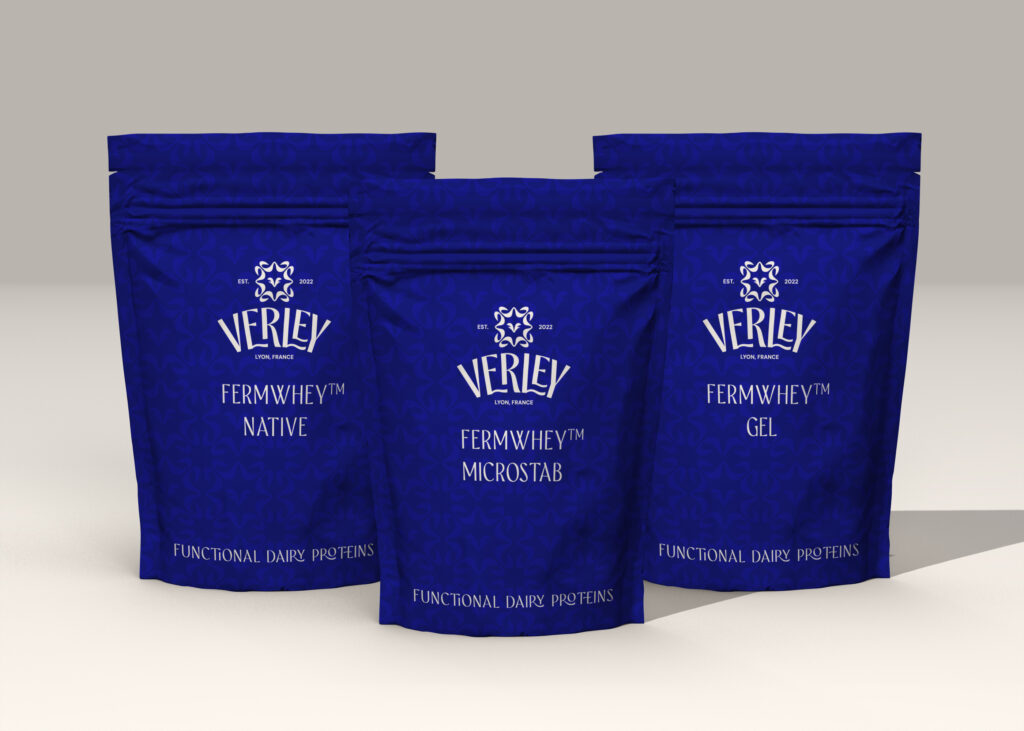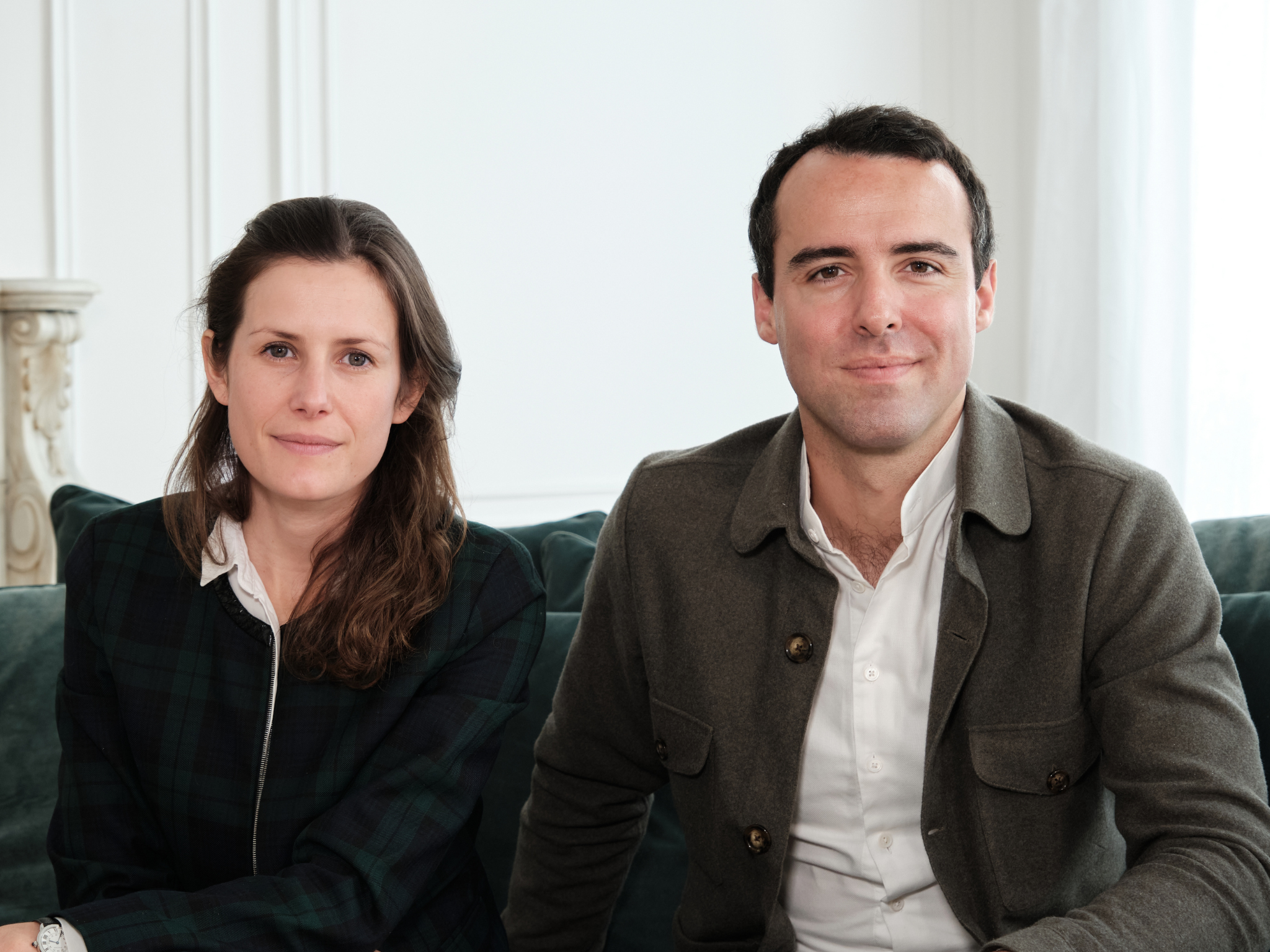This Animal-Free Dairy Startup Launched A Line of Functional Whey Proteins in the US
4 Mins Read
French precision fermentation startup Bon Vivant has rebranded to Verley and rolled out a range of functional animal-free whey proteins.
Bon Vivant, the animal-free dairy company hailing from Lyon, has introduced a new brand identity and a portfolio of functional recombinant whey proteins.
The company has rebranded to Verley, a moniker it says is reflective of its French roots and international ambitions. Lyon, it notes, is home to many villages with generations of dairy traditions that end in ‘-ey’.
Verley’s new FermWhey line is based on its cow-free beta-lactoglobulin protein, which is produced via precision fermentation. The three-strong range uses patented functionaliation technologies called MicroFactor and GelFactor to offer superior nutritional value, stability, and functionality from dairy proteins, without the animal.
“Using proprietary thermo-mechanical processes, MicroFactor and GelFactor adapt the protein’s structure to enhance the protein stability and enhance gelling properties, respectively, opening broader application opportunities such as high-performance protein enrichment and clean-labelling with texturiser replacement,” Stéphane Mac Millan, the firm’s co-founder and CEO, tells Green Queen.
FermWhey targets nutrition and functionality

Industry groups describe precision fermentation as a combination of traditional fermentation and the latest advances in biotechnology to efficiently produce a compound of interest – in this case, that’s whey protein.
Specifically, beta-lactoglobulin, which comprises 65% of the whey content in cow’s milk. It’s said to be nutritionally superior to most proteins and has gelling, foaming and emulsification properties that improve the mouthfeel and texture of a range of food and beverage applications. It’s also tasteless, heat-tolerant, and stable across a wide pH range.
These qualities are why a number of precision fermentation startups have focused on recombinant beta-lactoglobulin – think Californian pioneer Perfect Day, Israel’s Remilk and Imagindairy, Dutch firm Vivici, and Danish player 21st.Bio, among others.
Verley says it’s the first to apply functionalisation tech to animal-free dairy proteins. The three-year-old startup’s recombinant protein contains 11% more leucine (an amino acid key for muscle synthesis) than native whey protein isolate, and 50% more than soy proteins.
The FermWhey Native protein is designed for superior nutrition in dairy and alternative products, powders, high-protein snacks, and clear and acidic drinks. This ingredient is rich in essential amino acids and supports muscle maintenance, fast recovery, and healthy weight management by promoting satiety.
FermWhey MicroStab, meanwhile, is a microparticulated whey protein with “unprecedented heat and acid stability”, and is meant for use in UHT drinks and high-protein, low-fat formulations. According to the company, it provides high protein density (over 20%), maintains creaminess in fat-reduced recipes, and can support innovation in advanced nutrition, weight management, and sports supplement applications.
Finally, FermWhey Gel has advanced gelling properties to help manufacturers formulate clean-label recipes for spoonable dairy, cheese, desserts, and meal replacements. Using the GelFactor technology to enable proteins to form structured gels without stabilisers, it outperforms both conventional whey protein isolates and concentrates, and delivers these results at low inclusion rates.
Verley is expecting FDA approval letter this year

The FermWhey line solves several challenges in the conventional and alternative protein market. Verley argues that its offerings can fill nutritional gaps since many existing alternatives lack complete amino acid profiles or optimal protein digestibility.
Cow-derived dairy and plant-based proteins can struggle to deliver both technical and sensory performance, but Verley says its functionalised whey offers “unmatched stability, texture, and processing capabilities”. Plus, the recombinant beta-lactoglobulin requires 81% less water and 99% less land to produce, while generating 72% fewer greenhouse gas emissions, according to a life-cycle assessment by the French startup.
In addition, it addresses dietary needs for people across all age groups, with tailored food solutions for infant nutrition, healthy ageing, and more. Food manufacturers that typically face trade-offs between nutrition, stability and process compatibility may not need to make such compromises on their formulations, the firm argues.
Verley, which has raised $25M, has three patent families (with nine patents filed), and has secured contract manufacturing partnerships to scale up its production. It’s also working with dairy and ingredient companies and is looking to bring these solutions to market next year.
In December, the startup secured self-determined Generally Recognized as Safe (GRAS) status in the US, clearing the way for it to sell the protein. The self-affirmation pathway is in jeopardy, with new health secretary Robert F Kennedy Jr calling it a “loophole” and asking the Food and Drug Administration (FDA) to potentially eliminate the rule.
It would mean all novel foods would need to notify the FDA to receive the greenlight, in the form of a ‘no questions’ letter, potentially delaying the market entry for scores of products. Verley has already notified the agency for the three FermWhey ingredients and expects to receive approval this year, despite the uncertainty around staffing cuts in the government.
“We are still confident to receive the letter by the end of the year,” says MacMillan. “Vivici got it last month, i.e. seven months after their self-GRAS, and we expect to follow the same way.”



